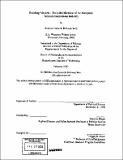Building markets : the liberalization of the European telecommunications industry
Author(s)
Weil, Rebecca Endicott Birdseye, 1970-
DownloadFull printable version (19.15Mb)
Alternative title
Liberalization of the European telecommunications industry
Other Contributors
Massachusetts Institute of Technology. Dept. of Political Science.
Advisor
Suzanne Berger.
Terms of use
Metadata
Show full item recordAbstract
This dissertation examines the process through which distinct national market structures and competitive dynamics could endure in the telecom industry, even as telecom markets were liberalized throughout the Europe Union. The opening of national markets and the international expansion of the telecom operators led many industry observers to predict that a single global market characterized by fierce competition among a few giant firms would emerge beyond the reach of national governments. In the European Union, the initiatives to create a common market for telecommunications posed a further challenge to the national governments' ability to maintain barriers to competition and influence market outcomes in the telecom industry. Finally, the convergence of telecoms, computing and broadcasting stimulated the rapid growth of the internet and a myriad of new on-line services that crossed borders indiscriminately and were very difficult for governments to control. Calling into question the strong predictions of globalization in the telecom industry, this dissertation explores how differences in national regulation, industrial policy and market shape the development of competition in the national telecom markets of France, Germany and the United Kingdom. In each national context policy makers and firms responded differently to the challenges of market liberalization and technological change. First, within the broad European regulatory framework, the national governments adopted different regulatory regimes to oversee the development of competition and the provision of universal service in the liberalized markets. Second, the national governments introduced distinct industrial policy initiatives and regulations to promote investment and innovation in new internet technologies. Third, the new entrants in the liberalized markets were politically powerful national players with very different core businesses and entry strategies. When the European telecom markets were opened to competition, these diverse policy choices and strategic responses created very different frameworks within which competition would develop and new markets for the internet and on-line services would grow.
Description
Thesis (Ph.D.)--Massachusetts Institute of Technology, Dept. of Political Science, 2000. Includes bibliographical references (p. 237-258).
Date issued
2000Department
Massachusetts Institute of Technology. Department of Political SciencePublisher
Massachusetts Institute of Technology
Keywords
Political Science.